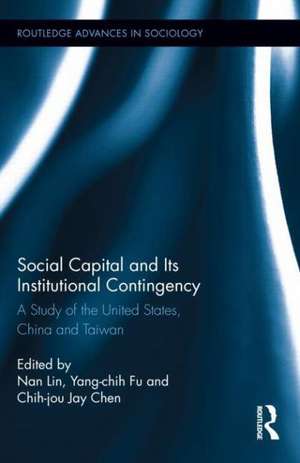Social Capital and Its Institutional Contingency: A Study of the United States, China and Taiwan: Routledge Advances in Sociology
Editat de Nan Lin, Yang-chih Fu, Chih-jou Jay Chenen Limba Engleză Hardback – 23 oct 2013
Din seria Routledge Advances in Sociology
-
 Preț: 385.10 lei
Preț: 385.10 lei -
 Preț: 152.38 lei
Preț: 152.38 lei -
 Preț: 309.12 lei
Preț: 309.12 lei - 20%
 Preț: 296.87 lei
Preț: 296.87 lei -
 Preț: 334.09 lei
Preț: 334.09 lei -
 Preț: 204.46 lei
Preț: 204.46 lei - 9%
 Preț: 865.97 lei
Preț: 865.97 lei -
 Preț: 310.81 lei
Preț: 310.81 lei -
 Preț: 326.40 lei
Preț: 326.40 lei -
 Preț: 311.41 lei
Preț: 311.41 lei - 8%
 Preț: 388.97 lei
Preț: 388.97 lei -
 Preț: 288.87 lei
Preț: 288.87 lei -
 Preț: 311.33 lei
Preț: 311.33 lei -
 Preț: 311.41 lei
Preț: 311.41 lei -
 Preț: 303.42 lei
Preț: 303.42 lei -
 Preț: 301.50 lei
Preț: 301.50 lei -
 Preț: 326.63 lei
Preț: 326.63 lei -
 Preț: 152.29 lei
Preț: 152.29 lei -
 Preț: 311.41 lei
Preț: 311.41 lei -
 Preț: 309.94 lei
Preț: 309.94 lei -
 Preț: 316.13 lei
Preț: 316.13 lei -
 Preț: 160.58 lei
Preț: 160.58 lei -
 Preț: 334.09 lei
Preț: 334.09 lei -
 Preț: 309.46 lei
Preț: 309.46 lei -
 Preț: 386.77 lei
Preț: 386.77 lei - 8%
 Preț: 388.91 lei
Preț: 388.91 lei -
 Preț: 310.60 lei
Preț: 310.60 lei -
 Preț: 310.22 lei
Preț: 310.22 lei -
 Preț: 310.51 lei
Preț: 310.51 lei -
 Preț: 283.77 lei
Preț: 283.77 lei -
 Preț: 311.41 lei
Preț: 311.41 lei -
 Preț: 295.09 lei
Preț: 295.09 lei - 8%
 Preț: 383.57 lei
Preț: 383.57 lei - 18%
 Preț: 1111.55 lei
Preț: 1111.55 lei -
 Preț: 445.38 lei
Preț: 445.38 lei - 18%
 Preț: 701.88 lei
Preț: 701.88 lei - 18%
 Preț: 1053.92 lei
Preț: 1053.92 lei - 18%
 Preț: 1002.36 lei
Preț: 1002.36 lei - 18%
 Preț: 1057.89 lei
Preț: 1057.89 lei - 16%
 Preț: 248.31 lei
Preț: 248.31 lei - 18%
 Preț: 1003.30 lei
Preț: 1003.30 lei - 18%
 Preț: 1109.21 lei
Preț: 1109.21 lei - 18%
 Preț: 997.11 lei
Preț: 997.11 lei - 18%
 Preț: 1061.22 lei
Preț: 1061.22 lei - 18%
 Preț: 1058.06 lei
Preț: 1058.06 lei - 18%
 Preț: 1002.36 lei
Preț: 1002.36 lei - 18%
 Preț: 1113.12 lei
Preț: 1113.12 lei
Preț: 1117.88 lei
Preț vechi: 1363.27 lei
-18% Nou
Puncte Express: 1677
Preț estimativ în valută:
213.90€ • 223.93$ • 176.99£
213.90€ • 223.93$ • 176.99£
Carte tipărită la comandă
Livrare economică 05-19 aprilie
Preluare comenzi: 021 569.72.76
Specificații
ISBN-13: 9780415899611
ISBN-10: 0415899613
Pagini: 470
Ilustrații: 14 b/w images, 232 tables and 14 line drawings
Dimensiuni: 152 x 229 x 28 mm
Greutate: 0.7 kg
Ediția:New.
Editura: Taylor & Francis
Colecția Routledge
Seria Routledge Advances in Sociology
Locul publicării:Oxford, United Kingdom
ISBN-10: 0415899613
Pagini: 470
Ilustrații: 14 b/w images, 232 tables and 14 line drawings
Dimensiuni: 152 x 229 x 28 mm
Greutate: 0.7 kg
Ediția:New.
Editura: Taylor & Francis
Colecția Routledge
Seria Routledge Advances in Sociology
Locul publicării:Oxford, United Kingdom
Public țintă
Postgraduate and UndergraduateCuprins
Introduction 1. Social Capital in a Comparative Perspective Nan Lin, Yang-chih Fu and Chih-jou Jay Chen Part I: Measuring Social Capital 2. Contact Status and Finding a Job: Validation and Extension Nan Lin, Hang Young Lee and Dan Ao 3. Homophily and Heterophily in the Position-Generated Networks in the U.S. and China Dan Ao 4. Status-Based Differential Memory and Measurement of Social Capital: Recall Errors and Bias Estimates Kuo-Hsien Su and Nan Lin Part II: Endogeneity of Social Capital: Structural and Network Features 5. Similarities and Differences in Relation-Specific Social Resources Among Three Societies: Taiwan, China and the United States Ray-May Hsung and Ronald L. Breiger 6. How Social Capital Changes During One’s Current Job: Work Conditions and Contact Patterns Yang-chih Fu, Ray May Hsung and Szu-Ying Lee 7. Occupational Sex Composition, Cultural Contexts, and Social Capital Formation: Cases of the United States and Taiwan Wei-hsin Yu and Chi-Tsun Chiu 8. The Internet Implications for Social Capital: Stock, Changes, and Tie Strength Wenhong Chen Part III: Accessing and Mobilizing Social Capital: Institutional, Networking and Organizational Factors 9. Job Search Chains and Embedded Resources: A Comparative Analysis Among Taiwan, China and the US Chih-jou Jay Chen 10. Network and Contact Diversities in Race and Gender and Status Attainment in the United States Joonmo Son 11. The Road to Democracy: A Three-Society Comparison of Civic Network Structures Yanlong Zhang and Hang Young Lee Part IV: Social Capital and Well-Being 12. Social Capital in the Workplace and Health Disruptions: A Cross-National Investigation Steve McDonald, Feinian Chen and Martha Crowley 13. Bright and Dark Sides of Who You Know in the Evaluation of Well-Being: Social Capital and Life Satisfaction Across Three Societies Lijun Song Appendix I: Social Capital USA 2004 Telephone Interview Questionnaire. Appendix II: Sample Characters for U.S., Taiwan, and China 2004-2005 Social Capital Surveys.
Descriere
This volume is a collection of original studies based on one of the first research programs on comparative analysis of social capital. Data are drawn from national representative samples of the United States, China and Taiwan. The three societies selected for study allow the examination of how political-economic regimes (command versus market) and cultural factors (family centrality versus diverse social ties) affect the characteristics of social ties and social networks from which resources are accessed and mobilized.

















